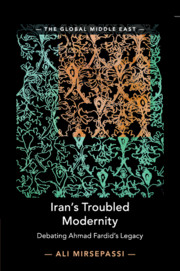
-
Select format
-
- Publisher:
- Cambridge University Press
- Publication date:
- December 2018
- December 2018
- ISBN:
- 9781108566124
- 9781108476393
- 9781108700269
- Dimensions:
- (228 x 152 mm)
- Weight & Pages:
- 0.65kg, 380 Pages
- Dimensions:
- (229 x 152 mm)
- Weight & Pages:
- 0.55kg, 382 Pages
- Subjects:
- Middle East Studies, Area Studies, History, Middle East History, History of Ideas and Intellectual History
- Series:
- The Global Middle East (5)
You may already have access via personal or institutional login- Subjects:
- Middle East Studies, Area Studies, History, Middle East History, History of Ideas and Intellectual History
- Series:
- The Global Middle East (5)
Book description
Ahmad Fardid (1910–94), the 'anti-Western' philosopher known to many as the Iranian Heidegger, became the self-proclaimed philosophical spokesperson for the Islamic Republic, famously coining the term 'Westoxication'. Using new materials about Fardid's intellectual biography and interviews with thirteen individuals, Ali Mirsepassi pieces together the striking story of Fardid's life and intellectual legacy. Each interview in turn sheds light on Iran's twentieth-century intellectual and political self-construction and highlights Fardid's important role and influence in the creation of Iranian modernity. The Fardid phenomenon was unique to the Iranian story, and yet contributed to a broader twentieth-century Heideggerian tradition that marked the political destiny of other countries under a similar ideological sway. Through these accounts, Mirsepassi cuts to the nerve of how deadly political 'authenticity movements' take hold of modern societies and spread their ideology. Combining a sociological framework with the realities of lived experience, he examines Iran's recent and astonishing upheavals, experiments, and mass mobilizations.
Contents
Metrics
Altmetric attention score
Full text views
Full text views help Loading metrics...
Loading metrics...
* Views captured on Cambridge Core between #date#. This data will be updated every 24 hours.
Usage data cannot currently be displayed.
Accessibility standard: Unknown
Why this information is here
This section outlines the accessibility features of this content - including support for screen readers, full keyboard navigation and high-contrast display options. This may not be relevant for you.
Accessibility Information
Accessibility compliance for the PDF of this book is currently unknown and may be updated in the future.


